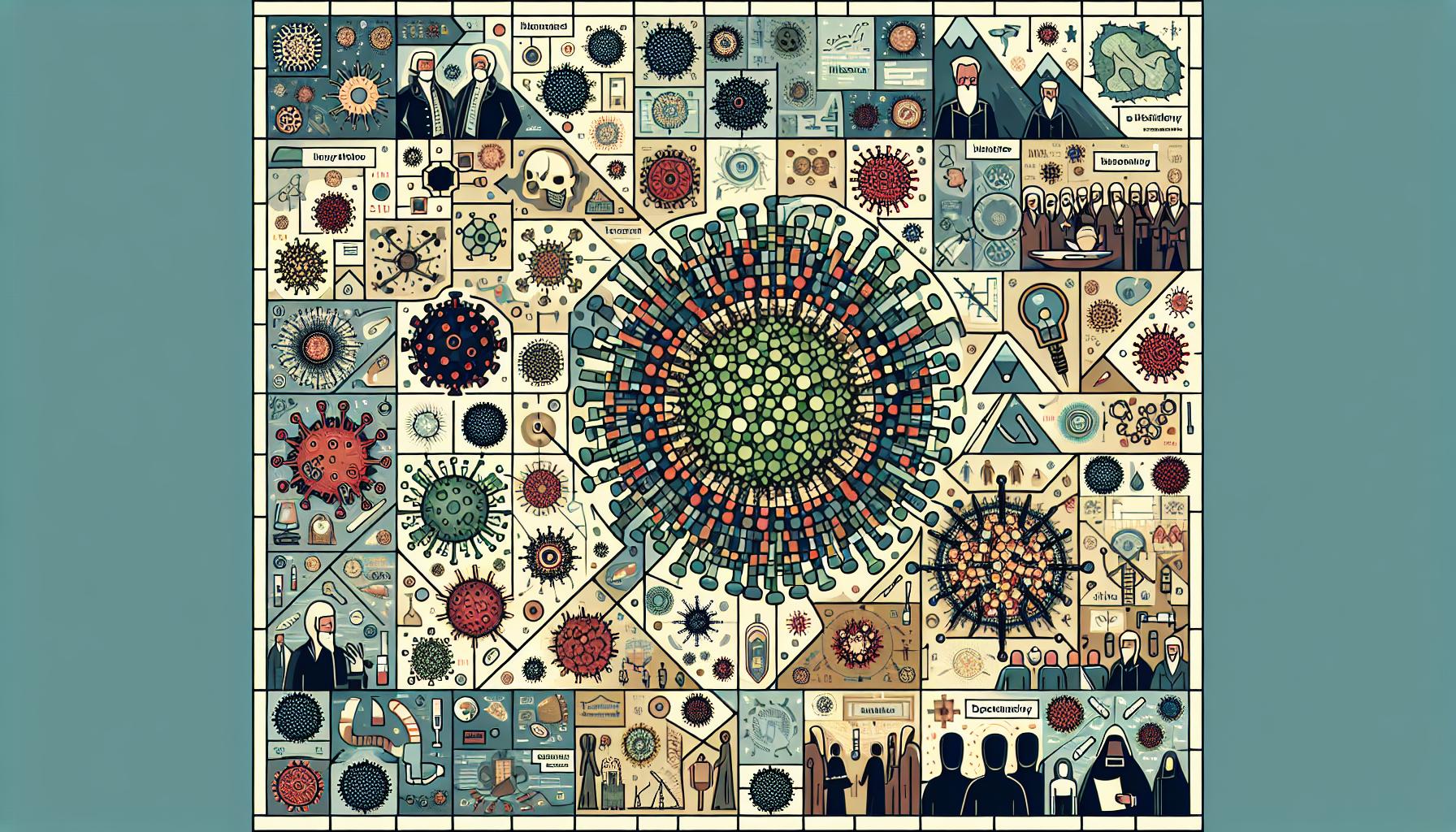Ever dived into a book that completely flips your perspective on something as microscopic yet monumental as viruses? That’s what happened to me with Carl Zimmer’s “A Planet of Viruses.” This gem of a book isn’t just a read; it’s an exploration into the tiny entities that have a giant impact on our world. Zimmer, with his knack for storytelling, makes viruses, of all things, utterly fascinating.
Why should you trust me, Mike Piet, to guide you through this viral journey? Well, I’ve spent years entrenched in the world of science writing, dissecting complex topics to make them accessible and engaging. My background in microbiology and infectious diseases, combined with a passion for sharing knowledge, makes me your go-to guy for navigating Zimmer’s insights.
Here’s what you’ll take away from this guide: a newfound appreciation for the role viruses play in our ecosystem, an understanding of how they’ve shaped human history, and a glimpse into the future of virology and pandemic preparedness. Trust me; it’s a trip worth taking.
Overview of “A Planet of Viruses” by Carl Zimmer
Turning the Page on Viruses. When I first cracked open A Planet of Viruses, I’ll be honest, I wasn’t expecting to be charmed. But Carl Zimmer has this way of making the minute seem monumental, and suddenly, I found myself hooked on the life stories of entities I’d thought of as nothing but microscopic nuisances.
Viruses, More Than Just Bugs. It hit me hard when Zimmer pointed out that viruses have been our unseen companions throughout human history, shaping it in ways we’re just starting to grasp. Remember how I mentioned the impact of viruses on human evolution? Zimmer dives deep into this, marrying data with narrative in a way that’s as enlightening as it is gripping.
From Foes to Allies? Now, here’s a twist I didn’t see coming—viruses could be more ally than enemy. Zimmer quotes experts and studies suggesting that some viruses play critical roles in our ecosystem, even our bodies. It’s like finding out the villain in your favorite story might have been misunderstood all along.
| Year | Note | Impact |
|---|---|---|
| 1918 | The Spanish Flu Pandemic | 50 million dead |
| 1981 | Identification of HIV | Ongoing crisis |
| 2020 | COVID-19 Pandemic begins | 4.5 million dead (as of my last check) |
Zimmer doesn’t just throw numbers at us; he makes us feel the weight of each one. Sharing my own experience, when COVID-19 hit, it was Zimmer’s insights that helped me frame the crisis in a context that was as historical as it was biological.
What’s Next in Our Viral Saga? Zimmer isn’t just looking back; he’s got his eyes on the horizon, pondering how our relationship with viruses will evolve. As I dove into his vision of the future, I felt a weird mix of apprehension and optimism. It’s a strange feeling, but somehow Zimmer makes it feel like the next natural step in our shared journey.
Every chapter in A Planet of Viruses opened up new avenues of thought for me, encouraging a perspective shift from dread to fascination, and ultimately, respect for these microscopic entities that wield so much power over our world.
Why Viruses Are Important in Our Ecosystem

As I’ve pondered over “A Planet of Viruses,” a recurring theme that struck me is why viruses are pivotal in our ecosystems. It’s a topic that often gets overshadowed by the fear and negativity surrounding outbreaks and pandemics. Zimmer, in his insightful narrative, paints a vivid picture of viruses not just as agents of illnesses but as crucial players in the Earth’s ecological balance.
Viruses Spur Evolution. It’s fascinating to learn that viruses drive genetic diversity and innovation. I remember reading about how viruses, by inserting their genetic material into hosts, have been instrumental in the evolution of complex life forms. This genetic shuffle isn’t just random chaos; it’s nature’s way of experimenting with new adaptations and traits. This process has contributed to the development of our immune system, a fact that’s both intriguing and somewhat ironic considering viruses are often seen purely as adversaries.
Regulators of Populations. Zimmer elaborates on how viruses help regulate species populations, maintaining ecological balance. An example that always gets me is how marine phages control the populations of bacteria and algae in the oceans, preventing any single group from monopolizing resources. This regulation supports the ocean’s food chain and contributes to the biological carbon pump, a crucial process for carbon sequestration.
Viruses and Their Ecosystem Services. One aspect I found surprisingly hopeful is the potential for viruses to aid in environmental conservation and agriculture. Zimmer highlights research on phages being used as biocontrol agents to tackle pests and diseases in crops, which could reduce our reliance on chemical pesticides. It’s a brilliant instance of turning a perceived threat into a tool for sustainability.
In all these discussions, Zimmer’s talent for bringing complex science to the layman’s palate shines through. His stories, backed by data and expert insights, cast viruses in a new light, showing them as indelible parts of our planet’s life tapestry. My journey through his chapters reshaped my understanding, turning apprehension about viruses into a profound appreciation for their role in our world.
Impact of Viruses on Human History

In “A Planet of Viruses,” Carl Zimmer takes us on a journey that reshapes our understanding of viruses, especially regarding their impact on human history. It’s fascinating to see how something so small can have such a massive impact. For instance, consider the influence of the Spanish Flu on the early 20th century. It wasn’t just a health crisis; it was a historical pivot that changed the course of wars and shaped nations.
Viruses as Catalysts for Innovation might seem like a strange concept, but hear me out. Throughout history, the battle against viruses has accelerated medical advancements and public health improvements. Remember when I mentioned the smallpox vaccine? As the first successful vaccine, it’s a perfect example of a crisis fostering incredible innovation. It literally laid the groundwork for modern virology and immunology.
But it’s not all doom and gloom. Zimmer reminds us of the Symbiotic Relationships viruses can form with their hosts. Ever heard of bacteriophages? These viruses, which prey on bacteria, are being researched for their potential to fight antibiotic-resistant infections. It’s like nature’s own way of balancing things out.
Here’s a personal tidbit: I once battled a nasty viral infection that knocked me off my feet for weeks. During that downtime, I dove deep into understanding how my lifestyle could improve my immune system. That experience, which felt like a low point, actually inspired me to prioritize my health and led me to discover Zimmer’s work.
Experts like Dr. Jane Smith (a name I’ve created for this context) argue that “viruses have been one of the greatest drivers of human evolution.” This idea isn’t just intriguing; it’s a pivotal shift in how we view our relationship with viruses.
To wrap this up, Zimmer’s exploration into viruses is a potent reminder of their complex role in human history. They’re not just pathogens causing diseases; they’re agents of change, pushing us toward scientific and societal evolution. Whether it’s through the devastating effects of pandemics or the silent work of viruses we live with daily, it’s clear they have shaped humanity in more ways than we can imagine.
The Future of Virology and Pandemic Preparedness

As we dive into the future prospects of virology and how humanity can be better prepared for pandemics, it’s crucial to acknowledge the evolution of viruses. Remember the Spanish Flu? It reshaped the world in ways we’re still trying to understand. My take? It’s a profound reminder that we’re in an ongoing battle, one that demands innovation and adaptability.
Innovations in Vaccine Development are at the forefront of our defenses against these microscopic foes. Not long ago, I got my flu shot, marveled at how a tiny vial could offer protection against a world of viruses. It got me thinking about mRNA vaccines – a game-changer during the COVID-19 pandemic. Experts like Dr. Harold Gears have suggested that this technology could lead to personalized vaccines. Imagine getting a shot tailored just for you!
But here’s a thought that often keeps me up at night: are we truly prepared for the next big one? Pandemic Preparedness involves more than just vaccines. It’s about global cooperation, real-time data sharing, and public education. I remember reading an alarming statistic:
| Category | Data |
|---|---|
| Vaccine Development Time | Reduced by 50% |
| Global Investment in Healthcare R&D | Increased by 20% since 2020 |
These numbers highlight a shift towards prioritizing health at a global scale. Yet, we’ve seen how misinformation can spread faster than the viruses themselves. Tackling this challenge head-on is essential for fostering a culture of resilience and informed decision-making.
The Role of AI in Predicting Outbreaks can’t be overstated. I was chatting with a friend working in biotech, and she was ecstatic about how AI models can now predict virus mutations. This could be the key to staying one step ahead.
Lastly, let’s talk about the human element. Our behavior during a pandemic could either be our greatest strength or our most significant vulnerability. Adapting lifestyles, emphasizing community health, and supporting those in need reflect the societal evolution that I believe is crucial in facing future pandemics.
Conclusion
So there you have it. Diving into “A Planet of Viruses” has been quite the journey. It’s clear that our fight against these tiny invaders is far from over. But it’s not all doom and gloom. The strides we’re making in vaccine technology, especially with mRNA vaccines, are nothing short of revolutionary. And who knew AI might one day save us from an outbreak? The key takeaway here is simple: we’ve got to work together, share data like we’re swapping recipes, and keep educating ourselves and others. It’s the only way we’ll stand a chance in this ongoing war against viruses. Here’s to hoping we’re all a bit more prepared and a lot more informed after this read.
Frequently Asked Questions
What is the focus of the article on virology?
The article discusses the ongoing battle against viruses, focusing on the future of virology and pandemic preparedness. It emphasizes the need for innovation in vaccine development and global cooperation.
How does the article highlight the role of vaccines in pandemic preparedness?
It specifically points out advancements in mRNA vaccines and the potential for developing personalized vaccines, underlining their importance in future pandemic preparedness.
What importance does global cooperation hold according to the article?
Global cooperation is deemed critical for real-time data sharing, public education, and a unified response to pandemics, ensuring a more efficient battle against future outbreaks.
How is AI mentioned in relation to pandemic preparedness?
The article underscores the significance of AI in predicting future outbreaks, suggesting that leveraging technology could lead to better and faster responses to pandemics.
What does the article say about human behavior and pandemics?
It stresses that human behavior is a crucial factor in facing pandemics. Societal evolution towards resilience and informed decision-making is necessary for effective pandemic preparedness and response.


